- Home
- Hammond Innes
Medusa Page 11
Medusa Read online
Page 11
I felt the chill of it in my guts. Man might be a rogue species; Petra certainly thought so and had discussed it with me in one of her more serious moments. But this – this was quite abnormal, quite outside of my experience. Once, and once only, I had undertaken an arms run. Explosives, detonators, some land mines, Kalashnikovs and Birettas – we had landed them in a deserted cove just south of Finisterre, handing the whole cargo over to Basque separatists. At least the Eta boys who took delivery had had a cause. But this …
I sat down in one of the chairs that stood by the saloon table, wondering what to do now. Go to the Guardia? Tell the plain-clothes detectives of the national police who had been put on to the case? But I could see the expression of disbelief on the face of the Inspector Jefe. I had met him once, a small, very dark man with eyes too close together and a sharp, suspicious face. They would be looking for somebody they could pin the atrocity on and I had a feeling I would do just as well as anyone else, so long as it was a foreigner and local politics not involved. The fact that I had been standing beside Martinez didn’t mean I couldn’t have organised the whole thing. And now, with the killer’s weapon in my hand, what the hell was I to do with it? Dump it at sea, I suppose. Take it out in the dinghy and dump it, somewhere out beyond Bloody Island, and hope nobody would have their binoculars trained on me at the time.
Carp arrived just as I put the kettle on. I heard his motor bike splutter to a stop on the quay and I called out to him to ask if he would like a cup of tea. By then I had cleaned myself up and dressed, everything more or less normal, except for the rolled-up bedding on the settle by the cockpit door. I told him I had spilled some oil on it and was taking it ashore to be cleaned.
He wasn’t surprised to find me on board at that hour. The boat was due to leave for Malta in a few days’ time and everything was in the last-minute-rush stage. We sat around for ten minutes or so, drinking our tea and talking over all the things that still had to be done.
It was when I was in the car and actually driving back along the waterfront, the gun in the back, that the idea came to me. I eased up on the accelerator, my mind racing as I glanced in the rear mirror. It was such a neat counter-thrust, but was I sure? Was I absolutely certain it was Evans who had planted that thing on board? But who else? And even if it was one of the others, then it didn’t make any difference. I eased into the parking space just past the commercial wharf, swung the wheel over, making a U-turn that headed me back, past the turning to Cala Rata and Mesquida, past the connecting road to the main Mahon-Ciudadela Highway and out along the Fornells road. A quarter of an hour later I had reached the crossroads and had turned right on to the side road heading to Port d’Addaia and Arenal d’en Castell, the sun higher now and the air warm as it blew in through the open sunshine roof.
The headland running out to Punta Codolar was brown against the blue of sea and sky. It was just after nine and everything bright and fresh. Bougainvillaea flashed purple on the wall of a villa. A beautiful morning, one of those days it was good to be alive. I should have been singing at the top of my voice. Instead, all I could think about was that bloody rifle and whether I would find Evans back from his voyage in the Santa Maria. What the hell did I do if he, or one of his mates, was in residence?
The villa rose slowly above the flat, scrub-clad rock of the headland like the rusty hulk of a ship coming up over the horizon. There were still vestiges of Miguel’s scaffolding clinging to the breeze-block sides and as I drove up to it I thought how ugly it looked in its half-finished state, its upper windows gaping squares that looked like the gun embrasures of a coastal defence blockhouse.
I parked the car and got out, standing for a moment, staring up at it, thinking about what I would say if there was somebody there. I could have left something behind. Any excuse would do. But there was no vehicle anywhere around and it looked empty enough. I went up to the door and hammered on it. Nobody answered. I tried it, but it was locked, or more probably bolted from the inside, for when I went round to the back, I found a hasp had been screwed on to the rear door frame and there was a brand new padlock to secure it.
The villa, isolated there on the very point of the headland, was several hundred metres from any other building. Looking round, I counted seven villas within sight, all of them only just visible, and all of them apparently deserted, no sign of any movement of either people or vehicles. The garage window was the one I finally chose, bunching an old dinghy sail I had in the car against one of the four panes and slamming my elbow into it until the glass cracked. Only one piece fell on the floor and that I cleared up later; the rest I was able to pull out by hand, leaving a neat empty square through which it was easy to reach the latch. There was always a chance that the absence of that one pane might go unnoticed for a time.
It took me several minutes to find what I wanted, a loose section of flooring where the electrician had been at work. It was in the kitchen and I prised it up with two of the knives lying among a pile of unwashed plates in the sink. Underneath, between the concrete base and the wood floor, grey plastic-coated wires followed the copper piping that carried water to the kitchen taps and the water heater above the draining board. I took the wrapping off the gun, wiped it over carefully with my handkerchief, then thrust it as far into the cavity as I could and hammered the shortened section of floorboard back into place with my feet.
Looking at it, I felt a certain sense of satisfaction. There was nothing to indicate that it had been tampered with, but police officers searching the building would certainly want to see underneath. I left by the way I had come, gathering up the little pile of broken glass and latching the window after me. It was only when I was driving back to Mahon that I began to wonder where Evans and his two men were now, how long it would be before they returned to the villa.
Back at Cala Figuera I found two plain-clothes detectives waiting for me, their car parked outside the chandlery. They were in the office, an inspector and his assistant, both of them drinking coffee while Soo, her dressing gown over her nightie, sat across the desk from them, looking pale and angry. ‘I keep telling them where we were sitting we couldn’t possibly have had anything to do with it. They came just after you left. They wanted to talk to you, but I didn’t know where you’d gone, how to get in touch with you, so they started asking me questions, then this man –’ she jerked her head at the inspector – ‘said they must search the house and they have been over everywhere, including the store.’ All this she said in a rush, the words tumbling over themselves. ‘Now they’re waiting for you, so I gave them some coffee.’ And she added, ‘They want to search the boat, too. They seem to think we’re hiding something.’
By then they were on their feet, their behaviour very correct. ‘Some questions please. Then we go to this catamaran you have acquired.’ The inspector was the taller of the two, a dark, hook-nosed man, his Spanish markedly Catalan. ‘You have been down to this catamaran this morning?’
‘Si.’ And I told him why. ‘It is due in Malta shortly to pick up some American tourists.’
‘So you are getting it ready.’ He nodded. ‘You go with it, or you stay here – which?’
I hesitated. It hadn’t occurred to me until then. ‘I’m not sure,’ I said. ‘Senor Carpenter may take her with just one other man, but if the weather is bad –’ I left it at that and he began questioning me about where I had been, what I had done after we had been allowed to leave the Albufera hospitality pavilion the previous afternoon.
‘I’ve already told him,’ Soo said.
He understood English, even if he did not speak it, for he said, ‘Si, si, but, señor, I wish to hear it from you.’
So we went over it all again, an interrogation that took about quarter of an hour. Then suddenly he seemed to get bored with it. ‘Now we go and inspect your ship please.’ He called it a barco, so avoiding the word catamaran. ‘You want to come, señora?’ He turned politely to Soo.
She smiled. ‘Not unless you insist.’
‘No, of course not. I do not insist.’ He bowed politely as she took her cue and left the office. ‘May I use your telephone please?’ He lifted the receiver and when he got through he spoke to somebody who was obviously his superior, reporting that he had discovered nothing new and telling him that they were on their way now to search the boat. ‘Si, Jefe. Señor Steele will be accompanying us.’
It took them a good hour to search the boat, and when they had finished, having failed to find what they were looking for, they settled themselves at the saloon table, the inspector taking out a notebook and beginning to scribble a report. Knowing from the phone call he had made in the office that they would stay here until their chief, an inspector jefe, arrived, I asked them whether they would like a drink. The inspector hesitated, then declined somewhat reluctantly. I told him I had work to do and would he excuse me, but he shook his head, becoming suddenly quite excited and making it very clear that I was to stay here on board.
‘For how long?’ I asked him.
‘As long as is necessary.’
‘And if I go ashore now?’
‘I shall be forced to stop you.’ He used the word detentión.
I went up on deck then and gave Carp a hand. He needed to go up the mast to reeve a new spinnaker halyard and wanted somebody else besides Luis on the winch. It was while we were hoisting him up in the bo’s’n’s chair that the Inspector Jefe arrived. As soon as Carp was at the top, we made the hoist fast and I went aft to welcome him.
‘Garcia Menendez.’ He gave a little bow as we shook hands, his manner polite, but at the same time assertive, his sharp eyes, almost black in the sunlight, staring at me full of alert curiosity. ‘Inspector Molina, is he still here? … Good. Then we go inside where there are no distractions.’ He made a gesture with his hand that seemed to embrace the sunshine, the water, all the movement of Mahon harbour at noon on a fine spring day. He had an engineer with him. He did not introduce him to me, but he did ask my permission before telling him to go ahead with a search of the engine compartments.
We went below and I offered him a drink. He shook his head, taking the inspector’s place on the banquette and waving me to a position opposite him. The engineer was already slipping into a pair of white overalls. I watched him as he folded back the steps to the starb’d hull accommodation and probed the interior of the engine compartment with his torch. I felt slightly sick, knowing that somebody must have told them where to look. ‘Some questions please,’ the jefe said. ‘Matters that have arisen in the course of our investigation. First, the ownership of this yacht which arrive here from Marseilles. There is a passenger on board. You know him?’
‘No.’ And I explained about the deal Evans and I had agreed on, all the time conscious of the engineer working his way into the afterpart of the engine compartment. Like so many engineers he was not a small man and I could hear him grunting with the effort of squeezing his way to a point where he could check the whole length of the prop shaft and the bilge cavity below it. There was no doubt about it – they had been told exactly where to look. If I hadn’t got there before them … i would like to see the documents please.’ Menendez’s words, sharp and official, cut across my thoughts. ‘The documents of exchange,’ he added. ‘You have exchanged a fishing boat and an uncompleted villa on Punta Codolar, you say, for this big catamaran yacht. Who is your lawyer?’
‘Martin Lopez.’
‘Ah si. And he has the documents I suppose?’
‘He is drawing them up,’ I told him. ‘It was all done in rather a hurry.’
‘The ship’s papers then. I would like to see the Certificate of Registry. Or are they also being prepared by your lawyer?’
That was when I realised how complete the trap had been, how cleverly prepared, for I couldn’t produce the ship’s papers, and all I could tell him was that I had seen them, but Evans had told me he had had to lodge them with the Banca Espagñol as security for a small overdraft he had requested after opening an account with them. ‘He is arranging for a copy to be sent to my lawyer.’
‘I have already spoken to Señor Lopez and he does not have it. He has sent it to England for the boat to be registered in your name.’
The engineer had emerged from the engine compartment, his overalls no longer white. He was breathing heavily and reported he had found nothing. ‘Then it is in the other engine,’ Menendez said. The engineer nodded and crossed to the port side of the saloon beyond the chart table and lifted the steps that covered that engine. Menendez watched me, waiting for some sign of panic. ‘Also,’ he said, speaking slowly, ‘there is some problem about the exchange document.’
‘What problem?’ I asked him. It was the first I’d heard that there was any difficulty over the paperwork and from what he was saying it was obvious he had known every detail of the arrangement between Evans and myself before coming on board and asking me questions. But then in a place like Mahon, where everyone of importance knew everyone else, I suppose it is inevitable, particularly as I was an extranjero. ‘That’s the first I’ve heard that there’s any difficulty over the papers,’ I told him. ‘Did you gather what the trouble was?’
‘Only that Señor Lopez was unable to contact this man Evans.’
‘He is away fishing. That’s why he wanted the Santa Maria in a hurry, so that he could earn some money fishing.’
The Jefe nodded. ‘Of course. He is a pescador.’ And then looking straight at me – ‘Do you think he is a good one?’ The thick lips under the hooked nose gave me a little crooked smile.
‘I’ve no idea.’
‘But you let him go off with your boat, the Santa Maria, and with no proper security. You are a businessman, Seóor Steele. Does it surprise you that I find that a little strange?’ He stared at me a moment, then switched his gaze to the torch-lit cavity of the open engine compartment, waiting for his engineer to report that he had found what they were looking for. ‘It is a question of dates,’ he added, his eyes still fixed on the starb’d side, the fingers of his right hand tapping impatiently at the table top. ‘The precise date when you take over this boat.’
I sat there, feeling numb, the trap springing shut, and seeing the way they had planned it, the devilish simplicity of it. He was watching me again now, pulling out a packet of cigarettes. He offered me one, and when I said I only smoked a pipe, he laughed, and then in the act of lighting his own, quite casually, he said, ‘The Cruz Rojo. You remember? And after, when the fireworks are over, where do you go then?’ And when I didn’t say anything, wondering what his question was leading up to, he went on, ‘It was the night of the gala Manuela Renato arrange in the Quarries above Figuera. We were both there. Remember?’
I nodded, wondering what Petra had said, or Soo, talking to the sisters, babbling under anaesthetic? Had they dreamed up a scenario in which I was involved in running contraband into the island?
‘No,’ he said. ‘You don’t forget because in the early hours of the morning your wife gives birth prematurely and your baby is dead.’
‘Have you found the men?’ I asked him. ‘The two men who pushed her down the slope in their haste to get out of that cave?’
He shook his head. ‘No. I don’t think we ever will. They are not Menorquin and we think they almost certainly leave the island very soon after.’ And he added, ‘Unless they go to the mainland of Spain, it is very difficult for us to trace their movements. Even in Barcelona, if they take the ferry, it is simple for them to disappear across the French border. No,’ he said again, ‘we do not know anything about them. What we do know, however, is that the night before there is a boat in Cales Coves and it is tied up against the rocks below the cave you were in that night. We have a description of that boat, a description that is indicative of a single mast and two hulls. We have checked with the harbour authorities and there is no boat of such description in either Mahon or Ciudadela, not in Fornells either – only this one.’
‘So,’ I said. ‘What is the significance of that?’ But I knew bloody we
ll what was in his mind.
He was smiling now. ‘Did you know there is a landward exit from that cave?’ And when I explained we had been solely concerned with the two men who had rushed out from that passage, he nodded. ‘Of course. And it is unfortunate about the father of Senorita Callis, that she is not here to answer some questions.’
‘You’re checking, I suppose, that her father really does exist, that his car accident did happen?’
‘Of course. It takes time, and meanwhile you are here to answer all our questions. Let us suppose,’ he said, his eyes almost closed. ‘It is just a thought, eh? Suppose it is this yacht that is in Cales Coves the night before she take you to that cave. What do you think it might be doing there?’
‘Sheltering, I suppose.’
‘Why? Why Cales Coves and not Mahon or Ciudadela?’
‘If they’d had a longish passage, from Mallorca or Corsica –’
‘Or Tunis,’ he said softly. ‘Somewhere along the shores of North Africa.’
‘If there’d been a passage like that,’ I told him, ‘with poor weather conditions you can get awfully tired, even in a stable boat like this. Then you just put in to the first shelter you find, head down and lights out.’
He nodded, still with that little smile. ‘Of course. I understand. But no navigation lights when coming in. Also there is a light in that cave mouth for a full hour before the boat appear. That is what attracted the attention of this witness we interview.’ He paused, watching me. ‘The boat has no lights all the time it was tied up under the cliffs, and there is no light any longer in the cave mouth. But there is the occasional flash of torches. There was a moon, you see, and some cloud in the sky.’ He sat back, suddenly relaxed. ‘Well now, you are a businessman, Seóor Steele, you have a position in Menorca, Spanish friends. But it was not always like that, eh? Before you come to Menorca, before your marriage. So, what does the description I have given you of what our witness saw suggest to you?’

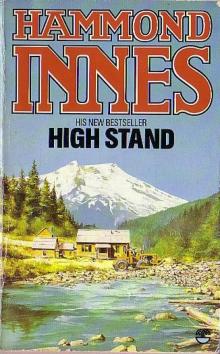 High Stand
High Stand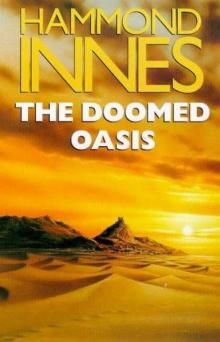 The Doomed Oasis
The Doomed Oasis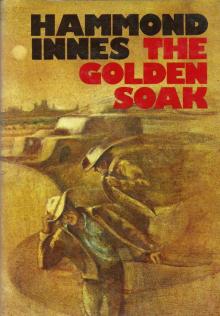 Golden Soak
Golden Soak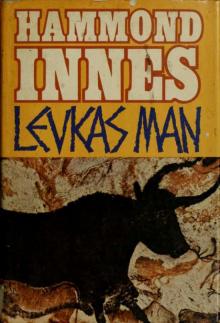 Levkas Man (Mystery)
Levkas Man (Mystery)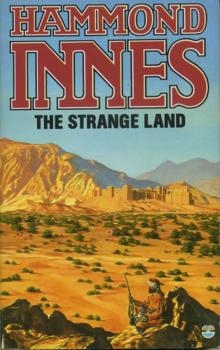 The Strange Land
The Strange Land Dead and Alive
Dead and Alive Attack Alarm
Attack Alarm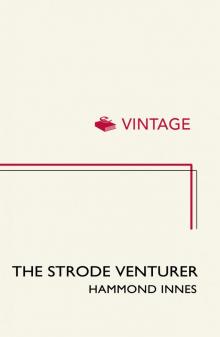 The Strode Venturer
The Strode Venturer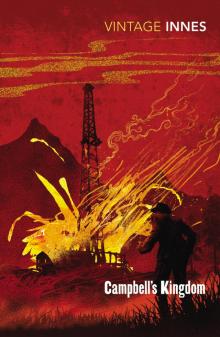 Campbell's Kingdom
Campbell's Kingdom North Star
North Star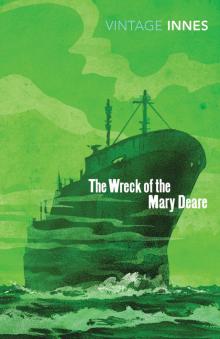 The Wreck of the Mary Deare
The Wreck of the Mary Deare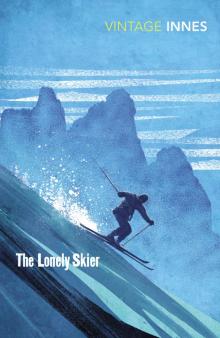 The Lonely Skier
The Lonely Skier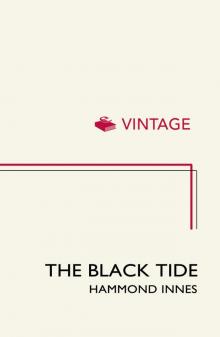 The Black Tide
The Black Tide The Trojan Horse
The Trojan Horse Medusa
Medusa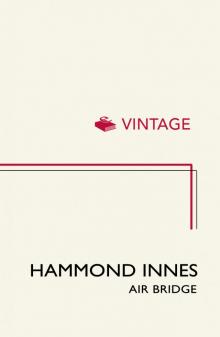 Air Bridge
Air Bridge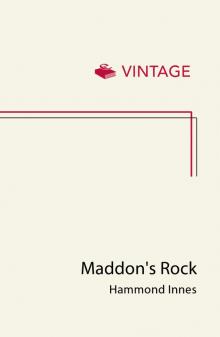 Maddon's Rock
Maddon's Rock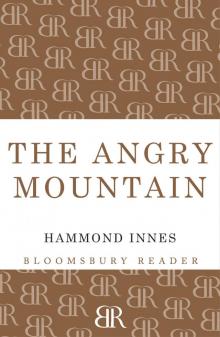 The Angry Mountain
The Angry Mountain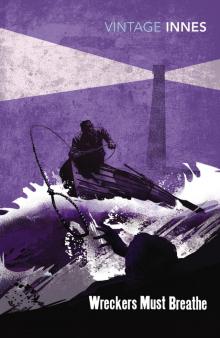 Wreckers Must Breathe
Wreckers Must Breathe Solomons Seal
Solomons Seal The White South
The White South